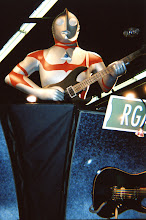
L.A. Times: Being a white rapper is always going to engender Eminem comparisons even if you are half Native American. Have those grown tedious yet or have you just tried to take them in stride?
Yelawolf: I can't be mad at the comparisons because I'm still just getting my feet wet. I've got years to go before I establish a full concrete Yelawolf sound. Right now, I'm focused on saying what I have to say. I have to do Yelawolf right now and not worry about anything else. That said, I think it's a fair comparison. There haven't been many white artists in hip-hop, and there's only a handful that the average person knows about, so it is what it is.
L.A. Times: Your mixtape "Stereo" had a lot of recognizable classic-rock samples, which ostensibly would've brought you a lot of fans from people who were sucked in by the original source material. Yet it was "Trunk Muzik" that really got you traction. Why do you think "Stereo" didn't have that sort of success?
Yelawolf: Two things: The first is that not everybody in hip-hop [messes] with classic rock. The second is that there was no real element of surprise. I'm from Alabama, I'm into classic rock -- it was obvious and there was no shock-value to it.That said, I was really focused on making sure that people understood that I respected the craft and hip-hop. "Trunk Muzik" was dedicated to the trunk riders, with 808s and hard ass [stuff]. It had a dirty Southern sound, and it opened things up.
With "Stereo," we spent a lot of time digging around and trying to be really tasteful with the samples. I know a lot of people who [mess] with "Trunk Muzik" aren't into "Stereo," but I still love it -- it contains some of the favorite records I've ever done.
L.A. Times: Growing up in Gadsden and all over the South has obviously influenced your sound. Specifically, how do you think it affects your conception of the world and your music?
Yelawolf: My homies in Gadsden aren't as exposed as I am culturally, which is awesome -- that's why I love going home. I'm in the kitchen with people who don't know anything but the simple life, what's important to them, and what's dope. That's why like I'm so drawn to the culture of Alabama -- of rednecks and all that hardcore dirty South culture because I understand it. It's so simple -- it's really black and white. That's the way that life should be. We really complicate our situation.
L.A. Times: The South isn't known for its cipher culture, but you use a double-time speed rap flow that could be Midwestern were it not for your drawl. What were your experiences like learning to rap?
Yelawolf: It was always rapping in the car -- me and my boys -- freestyling and being horrible. The only time it ever became serious to me was when I would write and then flow to instrumentals in the car, and my friends would be like, "Whoa man, you got verses." It spawned from there, it eventually got more and more serious and I developed my own style.
L.A. Times: How frustrating was it when Rick Rubin came aboard at Columbia and dropped you? You'd think that the guy who produced the Beastie Boys and "Raising Hell" would have wanted to work with you.
Yelawolf: I was like, "You don’t get it, cool? Then I guess I must be extra special." I had to be arrogant because I could've been messed up thinking that if he didn't want me, I must have nothing to offer. But that's not like me. I refuse to be like that. I've always been stubborn. I have to learn things myself, but it worked out OK -- I ended up at Interscope only a few years later.
L.A. Times: Do you worry that Interscope will force you to write pop rap songs or else you'll be unable to get your album released?
Yelawolf: If you look at my discography of music, you'll know that I can go any direction – whether it's arena rap or bluegrass hip-hop. I would never assign myself one style. If I make a record that becomes a pop hit -- who [cares]. I'm always gonna have the darker edgy music in my pocket because it comes so natural to me. You’ll never stop getting records like "Pop the Trunk" and "Good to Go." The crunk South [stuff] will always be a part of what I do in some way. But I plan on evolving -- you have to.
The integrity of my music is always in mind. I'm out to make lifelong lasting records. I know what the underground is. I’ve been there for a long time. You never really know what will break or what won't. If "Pop the Trunk" had had huge marketing behind it to put it on radio and video channels, it might've become a hit.
L.A. Times: If you could collaborate with anyone, who would it be?
Yelawolf: Willie Nelson. I really want to work with all the legends before it's too late.
(source)


No comments:
Post a Comment